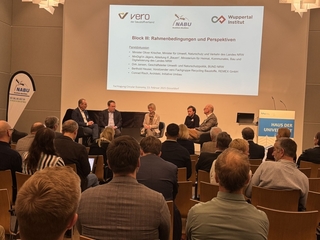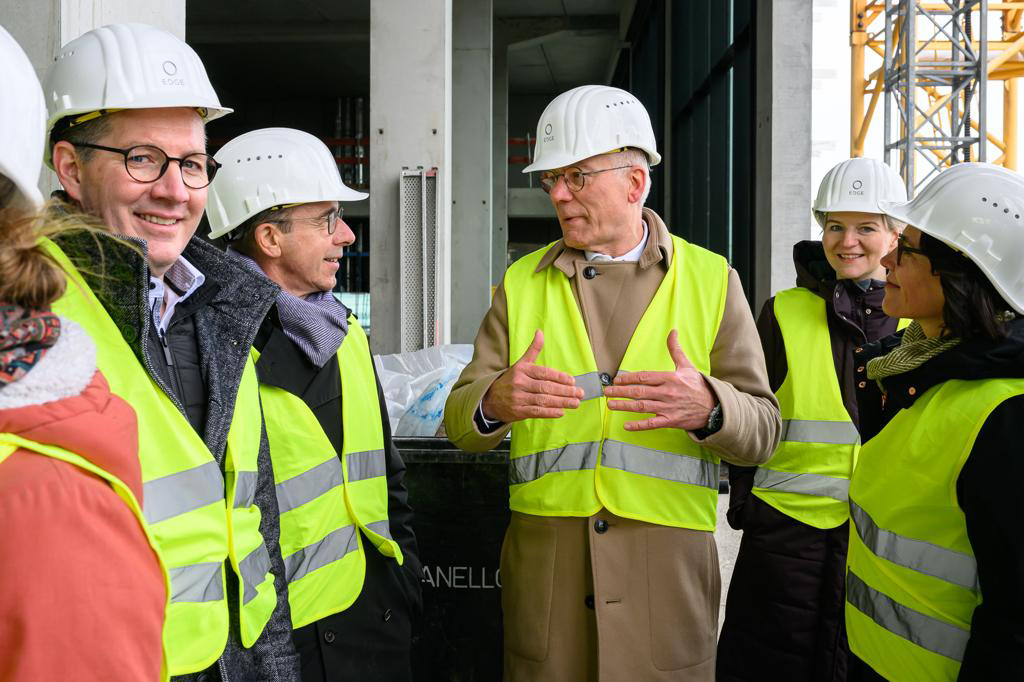Successful symposium ‘Circular Economy in the construction sector’ appeals to politicians
14.02.2025

Figure: BFT International
Yesterday, the symposium ‘Circular Economy - Strengthening the mineral recycling economy in the construction sector’ took place at the Haus der Universität in Düsseldorf. The joint event organised by the Association of the Construction and Raw Materials Industry (Vero), the Wuppertal Institute and Nabu NRW was held under the patronage of the Ministry of Economic Affairs, Industry, Climate Protection and Energy and the Ministry of the Environment, Nature Conservation and Transport of North Rhine-Westphalia.
Broad alliance for a more circular economy
The conference brought together high-ranking representatives from politics, science, industry and nature conservation to discuss ways in which the circular mineral economy can be promoted in the construction industry. The participants highlighted innovative approaches, potential and current challenges and agreed that an ambitious circular economy in the area of recycling and the increased use of secondary raw materials is essential in order to use raw materials more sustainably, reduce resource consumption and achieve climate targets.
Politics has a responsibility
Mona Neubaur, Minister for Economic Affairs, Industry, Climate Protection and Energy of the state of North Rhine-Westphalia, emphasised in her welcoming address that the public sector has a special responsibility: ‘The administration must create clear and manageable rules and use its high demand to promote lead markets for ecological products. We have missed out on potential here so far and need to become more focussed.’
The discussions made it clear that a stronger political course needs to be set in order to boost investment in secondary building materials and remove barriers.
Practical examples and future prospects
The lighthouse projects presented, such as the Büscher wall and Korbach town hall, were particularly impressive and clearly demonstrated how innovative recycling solutions can be successfully implemented in practice. The event ended with a panel discussion with leading experts, including Minister Oliver Krischer (MUNV NRW), Prof Dr Henning Wilts (Wuppertal Institute), Berthold Heuser (Remey GmbH) and Dirk Jansen (BUND NRW). Political and economic instruments for promoting the circular economy were discussed in depth and forward-looking approaches were debated.
Comments on the event
‘Our industry is clearly demonstrating that it is facing up to the challenges discussed today and will contribute to a circular economy and sustainable use of raw materials,’ emphasised Berthold Heuser, Chairman of the Vero specialist group for recycled building materials.
Dr Heide Naderer, Nabu State Chairwoman, added: ‘A stronger circular economy not only contributes to environmental and climate protection, but also reduces land consumption by using existing resources.’
Prof. Dr Henning Wilts, Head of the Circular Economy Department at the Wuppertal Institute, emphasised the role of politics: ‘We need binding framework conditions and clear incentives for increased private investment in order to promote the use of recyclates and enable a real transformation in the construction sector.’
Conclusion and perspective
The event made it clear that the circular economy in the construction industry not only makes ecological sense, but also economic sense. However, in order to realise its full potential, policymakers and stakeholders along the value chain need to create the best possible framework conditions for the industry to enable new approaches and put them into practice.
Further information
https://wupperinst.org/themen/kreislaufwirtschaft
Contact
Verband der Bau- und Rohstoffindustrie e. V.
Kim Walter
Düsseldorfer Straße 50
47051 Duisburg/Germany
+49 203 99239-23

